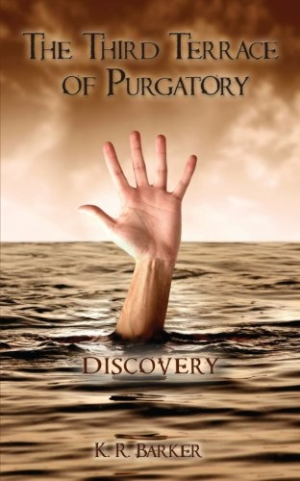The Third Terrace of Purgatory
Discovery
The stressful world of Manhattan advertising, characterized by the unrelenting pressure to succeed, grounds the first installment of K.R. Barker’s trilogy, The Third Terrace of Purgatory: Discovery. The story opens in 1959, yet the contemporary tone lends an excellent plot a sense of timeliness difficult to achieve in a historical novel.
The focus is on Kirk Saunders, creative director of an ad agency on the verge of bankruptcy. Trapped in a desultory marriage and pillowed in yet another relationship with a beautiful woman, this overworked, passionate protagonist is depicted in a gripping environment. Descriptions are filled with skillfully rendered details implemented without smothering the reader.
Woven into the action are indications of Saunders’s traumatized state of mind: “A silent scream. He sat bolt upright in his bed. The dreams had become more frequent, more vivid. Every night for the past few months Kirk had dreaded going to bed. He had been anaesthetizing himself with alcohol before retiring.”
Max Lombard, a double-edged marketing director for a business client, plays a secondary role as a conflicted soul with a dark secret and the man Kirk perceives as his antagonist. Dangerous and self-serving, Max tends to overshadow Kirk in this psychological thriller.
Realistic and chilling in its examination of human behavior, this novel is an outstanding accomplishment for a new writer. Barker’s primary and perhaps only flaw the occasional typographical error, such as missing punctuation. A somewhat ambiguous progression of events near the end presumably sets the backdrop for the second book, since the conclusion, as well as the ominous cover art—an open hand projecting from a body of water—is subject to interpretation.
This fascinating page-turner will attract a diverse audience looking for works that extend the boundaries of genre fiction while ignoring the industry’s tendency to place a book within a designated niche. Typical of many independently published novels today, Barker’s writing falls between the so-called promotional cracks, teetering along historical, thriller, and suspense definitions, which may be its hard-earned appeal.
Reviewed by
Julia Ann Charpentier
Disclosure: This article is not an endorsement, but a review. The publisher of this book provided free copies of the book and paid a small fee to have their book reviewed by a professional reviewer. Foreword Reviews and Clarion Reviews make no guarantee that the publisher will receive a positive review. Foreword Magazine, Inc. is disclosing this in accordance with the Federal Trade Commission’s 16 CFR, Part 255.

